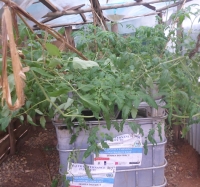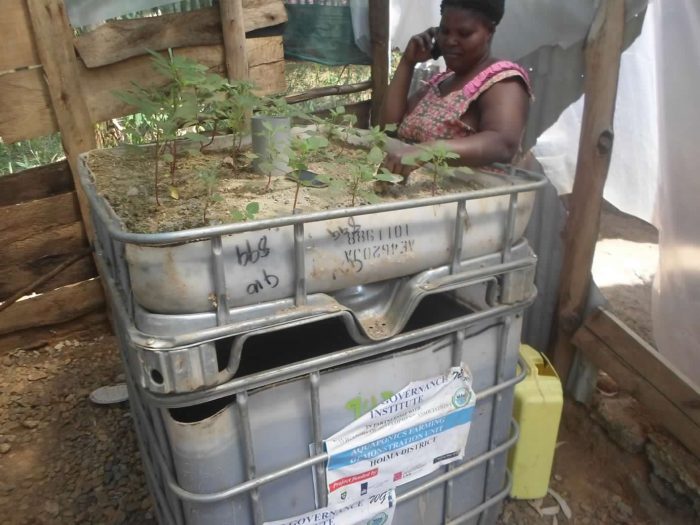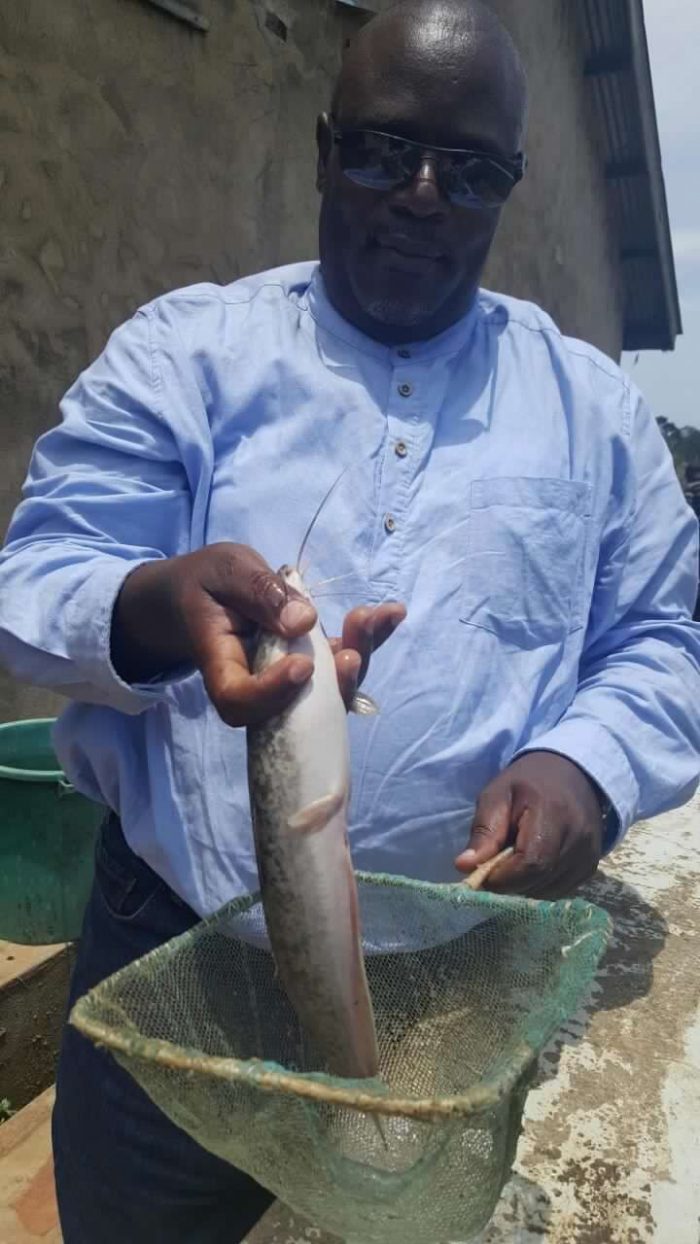
Empowering Women Using Aquaponics Farming in Uganda
Proscovia Rujumba’s Aquaponics unit with flourishing tomato plants, Mparo village, Hoima district
Background
in November 2015, Water Governance Institute (WGI) began a three year project aimed at promoting commercial Aquaponics farming among smallholder farmers/households for water efficiency, food security and livelihoods improvement in Uganda. The project was informed by:
- The need to provide alternative sources of fish considering that current natural fish stocks and sources (i.e. lakes, rivers & wetlands) are dwindling and unable to meet growing national and international market demands;
- The need to safeguard fish species biodiversity that is threatened by overfishing;
- The need to use water efficiently across the various food value-chains and other domestic and industry processes;
- High incidences of malnutrition among many households related to protein, mineral salts and vitamin deficiencies attributed to poor quality diets;
- The high premium market prices for fish and horticultural crop products and the impressive economic viability of Aquaponics farming compared to other alternatives;
- Increasing poverty among majority of households in Uganda; and
- Rampant un-employment among youth and women in Uganda.
Aquaponics farming involves integrating fish rearing and horticultural crop farming in a closed-loop water recycling system. Fish is reared in a tank and the crops are grown in a grow-bed which may be located above or on the sides of the fish tank and interconnected with pipes to assist in recycling water from the fish-tank to the grow-bed and back again into the fish-tank.
The crop-bed serves as a sanitation system to remove fish feces and breakdown the ammonia arising from the feces in the water. It is transformative in that it introduces integrated fish and horticultural crop farming to provide the much needed nutritional supplement and alternative incomes (if done commercially) in majority of the rural, urban or peri-urban household settings.
It is a low-cost technology approach. It encourages rainwater harvesting and storage at the household level, which water can then be used for other domestic purposes. Through recycling of water, Aquaponics uses water efficiently and saves water that can be used in other household or food-value-chain processes. It is also gender sensitive – it can employ all gender i.e. men, women, youth, physically handicapped, and the elderly.
The advantage of Aquaponics over other fish farming systems such as Rack Cages in Lakes and Ponds is that fish is protected from vermin (e.g. snakes, birds, frogs, rodents) and other externalities, including theft and floods. When managed properly, it is possible to harvest 98% – 100% of the fish fingerlings introduced into the system unlike other systems whose fish yields are usually less than 90% of stocked fingerlings.
WGI recognizes the unique role of women in a typical Ugandan household, given that they are traditionally responsible for fetching water and providing food for the health and nutrition of their families. Their activities directly affect the environment, as well as being disproportionately affected by food insecurity and climate changes. Women also tend to be more committed to rearing/growing crops and livestock compared to men. It is against this background that WGI decided to meaningfully involve them in the project. The following is a story of Proscovia Rujumba (a.k.a Prossy Rujumba), whose life has been positively affected by Aquaponics farming.
One woman’s determination to become a fish farmer, Mparo village, Hoima district
- m Prossy Rujumba, is a 44 year old mother of 4 children, who lives in Mparo North Sub-country, Mparo village, Hoima district. For long Prossy was a simple pond fish farmer faced with several challenges. Vermin and flood loss often affected yields and threatened the viability of her fish farming project. On one occasion in 2014, she found all the fish in her pond had mysteriously disappeared.
In 2015, Prossy was privileged to be among the people chosen by the local government of Hoima district to be trained by WGI on Aquaponics farming. She received severe training and sensitization on how to establish the Aquaponics system, how to manage it and the value of using the Aquaponics farming system. From the sessions, she was also able to gain knowledge on how to use water efficiently by reusing wastewater, innovative water capture and storage. She realized that this was a cheaper method of producing high quality proteins and crops at the same time.
Armed with this knowledge, in May 2016, Prossy with the help of WGI set up the aquaponics system at her home in which she currently rears fish and grows horticultural crops.

“At first it was hard to believe the system works, I thought it was impossible but I gave it a try”, says Prossy.
After years of little to no success as a pond fish farmer, Prossy was able to harvest 200 fish each weighing 1kg from the first harvest using a one-cubic meter Aquaponics system. She had stocked 200 fish fingerlings in the unit. This means that she harvested 100% of the fish stocked. She also harvested 96 tomatoes that she sold at Ugx Shs.160,000(US$44.4). She was able to sell 195 fish at the cost of Ugx Shs.10, 000 each which earned her Ugx Shs.1,950,000(US$541.67) cash. The balance was eaten in her home. She has restocked the unit with new Eggplant crop and has order for a new fish fingerling stock.
“With the Aquaponics unit at least am assured of the harvest unlike the pond” she says. “The benefits have been numerous; my family is healthier from the fish that was added to the diet. I have been able to support my husband provide basic needs for the family and also contribute school fees for my children”, she says.

Prossy is happy; “I am glad that my dream of becoming a commercial fish farmer is gradually coming to pass”, she narrates with a wide grin! She challenged WGI to give her a larger Aquaponics unit for her to realize her dream. She says the market demand is overwhelming when using smaller sized Aquaponic units. Albeit the low quality of the photograph, She shared with the WGI team a photograph of the fish she harvested from the unit
To date, Prossy has remained a star among fellow women in Mparo.She has also been central in helping community members appreciate Aquaponics farming.

“We are supporting rural households – especially women – adopt Aquaponics farming as a means of securing household food and income security. Using Aquaponics we are introducing unique businesses that efficiently use water and space and do not use soil as the main growth medium i.e. it is business unusual”, says Henry Bazira, the Executive Director of Water Governance Institute.
For more information visit Get the Article here








